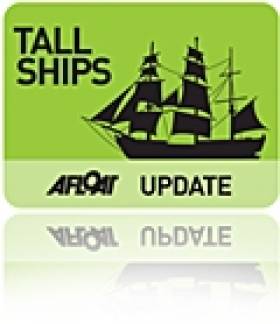Displaying items by tag: Tall Ships Ireland
#tallships – Last July, eight youngsters from Ireland that were taking part in a voyage on the Tall Ship "Astrid" got more than they bargained for when the ship got into difficulty near Kinsale during an Irish Sailing Association 'Gathering Cruise' and foundered on rocks. Nine months later, the 100–year–old Dutch ship's journey finally came to an end in a skip when it was cut up for scrap. Here Michael Byrne of Sail Training Ireland relates the outcomes of the ordeal for the 24 trainees from five countries and how the Irish trainees are now back at sea this week on an Irish Vessel, the 'Spirit of Oysterhaven', a vessel that was involved in Astrid's crew rescue.
There were two striking outcomes after the ordeal.
1. How closely the trainees had bonded during their previous ten days at sea, evident in how they cared for each other and how difficult they found it to disband the group when the time came.
2. How anxious they AND THEIR PARENTS were to get them back to sea.
This week that dream came through for some of the Irish Trainees who are taking part in a 5 day voyage on the Cork Coast, largely coordinated by themselves, on Irish Sail Training Vessel "Spirit of Oysterhaven" a 70' Schooner based in Cork. The voyage is part of a "Youth Initiative" project, funded by the EU Commissions "Youth in Action" programme, and overseen by Sail Training Ireland which includes a total of 8 trainees.
The educational programme of activities and workshops is based on environmental awareness and the "Leave no Trace" policy. The trainees are examining the level of rubbish at sea and will be making a public demonstration by building a sculpture out of rubbish they collect.
Sail Training focuses on the valuable life skills that are developed in the participants through the experience of life at sea on a sailing vessel such as; self-confidence, resilience, responsibility and a willingness to rely on each other. Trainees become part of a working crew of the Tall Ship or Sailing Vessel and must work together to operate the ship day and night. Such voyage are excellent opportunities to develop important skills and characteristics and also to develop educational concepts such as environmental awareness, cultural awareness, citizenship and leadership.
Sail Training Ireland, and its members, continue to work to develop more of these programme so that the young people of Ireland have the opportunity to experience life at sea, explore our maritime heritage as a seafaring nation and benefit from the adventure of a lifetime.
There are many more voyages taking place in 2014 both on Spirit of Oysterhaven and on various other Tall Ships that have been arranged to visit our ports.
7 Tall Ships will sail from Belfast to Dublin at the end of May with over 100 young people aged 16-27 years funded to sail on board.
























































